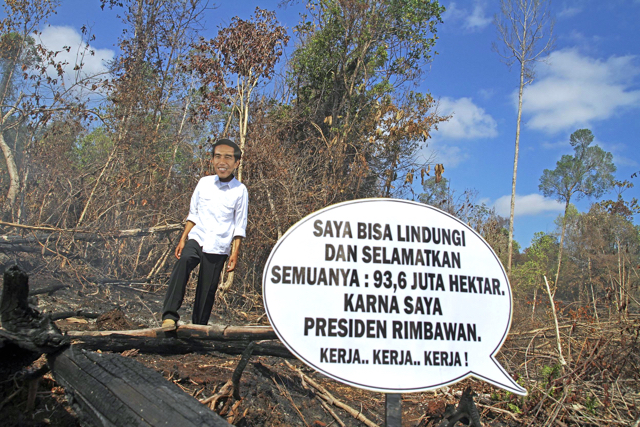‘Copy-paste’ not good enough for civil society groups calling for the policy to be strengthened

A Greenpeace activist dons a mask of Indonesian President Joko “Jokowi” Widodo in a smoldering peat forest that is supposed to be protected by Indonesia’s partial forest clearing moratorium, next to a speech bubble that reads, “I can protect and save it all: 93.6 million hectares. Because I am the Forester President! Work… work… work!” Photo courtesy of Greenpeace.
Indonesian President Joko “Jokowi” Widodo extended the country’s partial forest-clearing moratorium yesterday on the day of its expiration, leaving largely intact a policy civil society groups had demanded be strengthened.
Environment and Forestry Minister Siti Nurbaya said the government greatly appreciated the calls from organizations like Greenpeace, Walhi, Kemitraan, Sawit Watch, World Resources Institute and others, and that now that the extension was official, a detailed, cross-ministerial dialogue to address the proposed changes could begin.
Activist groups had asked for the moratorium itself to be strengthened. At present, the policy, which bans new industrial concessions in primary forest and on peatland, exempts secondary forest and existing concessions and makes exeptions for “national development” projects – geothermal, oil and gas, electricity, rice, sugarcane – as well as any concession Siti’s ministry chooses to allow.
Greenpeace, for one, had wanted the president to do away with those exceptions and bring all forest and peatland under the moratorium’s protection.
“Of course we are disappointed with the president for simply extending the previous policy with no significant change,” Greenpeace campaigner Teguh Surya told Mongabay-Indonesia.
He was dubious about the ministry’s promise to follow up, given the problems of coordination among the various arms of government. It wouldn’t make much difference, Teguh said, “unless the president himself leads discussions to change the strength” of the moratorium.
Citra Hartati, a researcher from the Indonesian Center for Environmental Law, said the government needed to do more than “copy-paste” the old policy. “The question is whether it’s the same as before,” she said. “Don’t let the moratorium be compromised.”
The moratorium was introduced in 2011 under an agreement with Norway and extended in 2013 for another two years. As the latest expiration date drew nearer, calls to strengthen the flagship conservation policy became a rallying cry to improve Indonesia’s forest governance regime in a variety of ways.
Besides an upgrade of the moratorium to a presidential decree from a presidential instruction, which is not necessarily legally binding, activists wanted the extension to be accompanied by measures to boost enforcement, address the country’s chaotic forest tenure regime, strengthen problematic regulations and review existing licenses.
“The extension of the moratorium cannot be separated from those four points,” said Andiko Sutan Mancayo, head of the National Forestry Council (DKN). “If it is, than the policy is just for show.”
He clarified that the government had already moved to address these points, but not in a consolidated manner.
“We need one province where we can see all these measures in effect at once,” he said. “Like Riau or Jambi, for example. There should be a moratorium on all permits, followed by a full permit review and a large-scale remastering of the composition [of the landscape of industrial concessions] with the people and environment in mind.”
The government has undertaken various area- or concession-specific permit reviews, and the One Map initiative is an attempt to fix Indonesia’s chaotic land tenure regime, which bears much of the responsibility for the country’s thousands of active land conflicts.
To strengthen the moratorium as well as environmental protection more broadly, Arief Yuwono, the Environment and Forestry Ministry’s deputy for degradation and and climate change, said the government would use a variety of instruments, including the Forestry Law, the Plantation Law, the Disaster Management Law, the Spatial Planning Law and the Law on Protection and Management of Peat Ecosystems.
“We will not erase previous government initaitives that have been good,” he said. “We will strengthen them.”
Produced in English by Philip Jacobson.
Citations:
- Sapariah Saturi, Ridzki Ridzki Sigit and Indra Nugraha. “Presiden Perpanjang Moratorium Izin Hutan, Apa Kata Mereka?” Mongabay-Indonesia. 13 May 2015.